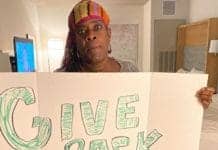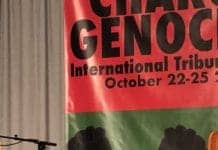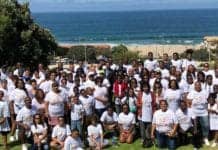Oakland rallies in solidarity with historic Georgia prisoners’ strike
by Malaika Kambon

• A living wage for work: In violation of the 13th Amendment to the Constitution prohibiting slavery and involuntary servitude, the DOC demands prisoners work for free.
• Educational opportunities: For the great majority of prisoners, the DOC denies all opportunities for education beyond the GED, despite the benefit to both prisoners and society.
• Decent health care: In violation of the Eighth Amendment prohibition against cruel and unusual punishment, the DOC denies adequate medical care to prisoners, charges excessive fees for the most minimal care and is responsible for extraordinary pain and suffering.
• An end to cruel and unusual punishment: In further violation of the Eighth Amendment, the DOC is responsible for cruel prisoner punishments for minor infractions of rules.
• Decent living conditions: Georgia prisoners are confined in overcrowded, substandard conditions, with little heat in winter and oppressive heat in summer.
• Nutritional meals: Vegetables and fruit are in short supply in DOC facilities while starches and fatty foods are plentiful.
• Vocational and self-improvement opportunities: The DOC has stripped its facilities of all opportunities for skills training, self-improvement and proper exercise.
• Access to families: The DOC has disconnected thousands of prisoners from their families by imposing excessive telephone charges and innumerable barriers to visitation.
• Just parole decisions: The Parole Board capriciously and regularly denies parole to the majority of prisoners despite evidence of eligibility.

Rising like a phoenix from the examples of struggle and resistance in the ‘60s and ‘70s, about 50-75 people held a rally and march despite the driving rain in support of prisoner demands and to protest the vicious retaliation being used by the state of Georgia in an effort to break the unity which has been forged by the striking prisoners, who – in their own words – intend to “ride it until the wheels fall off,” until they get their human rights.
The fiercely determined group of resisters to police and prison industrial complex brutality were Afrikan, Asian, Latin@, white and more – retired workers, students, labor union organizers, small children, prison organizers and just folks stopping briefly at the end of the day to see what was going down.
Cars honked in support. We stopped traffic on the way.
There was no visible police presence; i.e., we did not get brutalized or beaten to death as we made our way from North County Jailto the steps of Oakland’s City Hall, where more demonstrators awaited the march.
There were solidarity messages from San Quentin and other prisons.
There were speakers with solidarity messages, from Martina Correia, sister of Troy Anthony Davis, an innocent Afrikan man who currently sits on Georgia’s Death Row. The state of Georgia has attempted to execute him three times.
There were speakers representing Kevin Cooper, another innocent Afrikan man, currently on California’s Death Row.

“On Thursday, Dec. 9, 2010, the inmates in the state of Georgia sat down in unity and peace in order to stand up for their human rights. African American, White and Latino inmates put aside their differences, if they had any, and came together as a ‘People’ fighting for their humanity in a system that dehumanizes all of them. For this they have my utmost respect and appreciation and support. I am in true solidarity with them all!”
There were speakers there who made the vital connections between the liberation struggles in the Sudan, Haiti, Palestine, the Congo and more; who made the connections between struggles in ecology, labor, education, economics and housing; who fight against poverty with the same determination as they fight against police brutality, the prison industrial complex, and the wanton killing of our sons, daughters, elders and peers; who fight against racial injustices as well as divisions of caste and class.
All in all, the message was clear: We stand in solidarity with Georgia’s striking prisoners.
We vow to continue to organize, because we need more people. Inclement weather cannot and did not stop us.
Remember Attica! Fight for Haiti! Pamojas Tutashinda! ‘Til the wheels fall off, and beyond!
Malaika H. Kambon is a freelance photojournalist, owner of People’s Eye Photography and an MA candidate in Interdisciplinary Studies at San Francisco State University. She can be reached at kambonrb@pacbell.net.

 Store
Store












